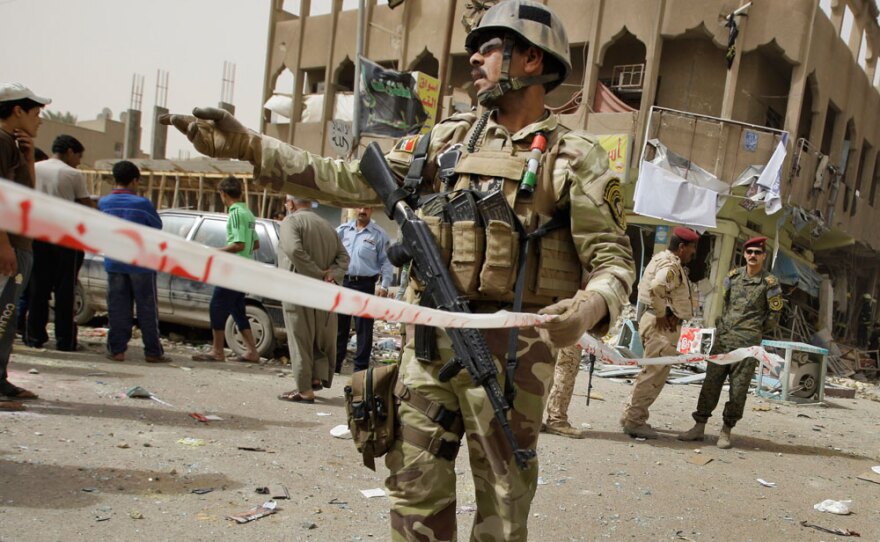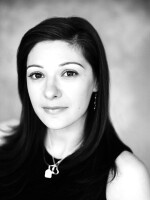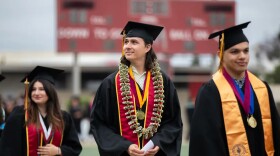Bombs rocked Baghdad Thursday, killing at least 12 people, as early voting began in national elections to select a new Parliament to run Iraq as U.S. forces depart later this year. The violence — and bombings a day earlier in Baqouba that killed dozens — stoked sectarian tensions and prompted heightened security across the country ahead of the main voting on Sunday.
The election will determine the character of Iraq's next government and could affect the pace of the planned withdrawal of about 100,000 U.S. troops.

It poses a test for Prime Minister Nouri al-Maliki, who came to office in 2006 and is seeking re-election amid fears that tensions between Shiites and Sunnis could return Iraq to the kind of sectarian violence that plagued the country in the past.
Here's a preview of the election and what's at stake:
What: A national election to choose Iraq's next Parliament, determining who will be the next prime minister and the alliances that will control the government. Iraqis will cast votes for one of many political parties fielding lists of candidates. About 6,200 candidates are running for 325 seats.
When: Sunday (though for some select groups, including security personnel, early voting began Thursday). Parliamentary elections were last held December 2005.
Where: Across Iraq's 18 provinces, and out-of-country balloting by Iraqis living abroad. There are 18.9 million eligible voters in Iraq, and the U.N. says the out-of-country vote could range from 300,000 to 3 million. Turnout is difficult to predict; in 2005 it was 79.6 percent.
Whom to watch: Many of the same faces are back, including current Prime Minister Maliki, former Prime Ministers Ayad Allawi and Ibrahim al-Jaafari, and onetime Bush administration favorite Ahmad Chalabi. Some of the old alliances are broken. Sunni and Shiite groups have split, former allies are now opponents, and the field is bigger, which means no one party is likely to have a clear victory.
Maliki, a Shiite who once led the Shiite Dawa group, now has his own list, the State of Law Coalition, which is seen as an alternative to the religious-based Shiite parties.
Allawi, a secular Shiite, was joined by Tareq al-Hashimi, the Sunni vice president, whose own Sunni political group fell apart last year, to form the Iraqiya coalition. They are also joined by key Sunni politician Saleh al-Mutlaq, but Mutlaq was barred from the election for alleged ties to the now outlawed Baath Party.
A new group, the Iraqi National Alliance, has been forged between two Shiite rivals: followers of radical cleric Muqtada al-Sadr, and the Iranian-backed Islamic Supreme Council of Iraq.

Is the makeup of the new government likely to change? Unlike in the last parliamentary elections, Sunni Iraqis are expected to participate in the vote. Their boycott in 2005 led to Sunnis being largely shut out of Parliament as well as senior Cabinet positions. This time, with Sunni candidates in the running and Sunnis expected to vote, they may do better. Ethnic Kurds, mainly in northern Iraq, have experienced their own political tumult in recent years. A smaller Kurdish breakaway group has challenged the status quo in parts of Kurdistan. If it has a good showing in Sunday's vote, it could affect Iraqi President Jalal Talabani and his party, the PUK, and their ability to win ministries in the new government.
What effect will elections have on U.S. plans to withdraw its troops? Despite the possibility that it may take months of political wrangling before a new government is formed, the Pentagon says it will not alter its plan to begin withdrawing troops. A Pentagon spokesman said Wednesday that it would take an "extraordinarily dire turn of events" in Iraq to warrant a change in plans. Everything is on track, the Pentagon says, to meet President Obama's goal of cutting U.S. troop levels in Iraq by half — to 50,000 — by Sept. 1.

What are the major issues facing Iraqi leaders? Security, public services and national reconciliation are still the major challenges. Iraq's Shiites are estimated to make up about 60 percent of Iraq's population of 29 million. Arab Sunnis and ethnic Kurds (also Sunni Muslims) each account for about 20 percent.
While the larger Shiite parties have talked up national unity and de-emphasized the role of religion in the campaign, many Iraqis are still expected to vote along ethnic and sectarian lines. A sign of the sectarian divide: Hundreds of potential Sunni candidates were banned from running in the election because of their suspected ties to the Baath Party. Iraq's Shiites are estimated to make up about 60 percent of Iraq's population of 29 million. Arab Sunnis and ethnic Kurds (also Sunni Muslims) each account for about 20 percent.
Provincial boundaries, distribution of wealth and resources, and of course, oil, are all critical issues, and all remain unresolved. The status of Kirkuk — the northern, oil-rich province, contested by Iraq's Arabs and Kurds – also remains divisive.
Are women running? Yes. The Iraqi Constitution requires that women fill at least 25 percent of the seats in Parliament; thus political parties must represent women in their lists of candidates.

Will the elections be free, fair and safe? The last time there were parliamentary elections, accusations flew far and wide over ballot box stuffing, intimidation and violence at polling centers and other irregularities. But afterward international monitors said the vote "generally met international standards." With thousands of Iraqi and foreign election monitors expected to oversee Sunday's voting, hopes are high that elections will be free and fair. But the possibility of violence in Iraq remains high and could mar the balloting. Iraqi security forces are on a state of alert, and the Iraqi government has declared a national four-day holiday to allow everyone to get to the polls.
When will the results be in? Once the complicated counting is done, polling stations will post results outside their booths for 24 hours and individual parties may issue their own tallies. But it will take much longer for the Independent High Electoral Commission to release official results and certify them. Expect allegations of fraud and vote rigging to follow. U.S. Embassy officials and Iraqi election officials do not expect official results before the end of the month.
What happens next? Maliki remains caretaker prime minister while the votes are tallied and a new government is formed. Iraq's Constitution stipulates that the new Parliament must sit 15 days after the vote takes place. Once it meets, it must elect a new prime minister, president and parliamentary speaker. However that is expected to take weeks, if not months.
Copyright 2022 NPR. To see more, visit https://www.npr.org. 9(MDAzMjM2NDYzMDEyMzc1Njk5NjAxNzY3OQ001))







